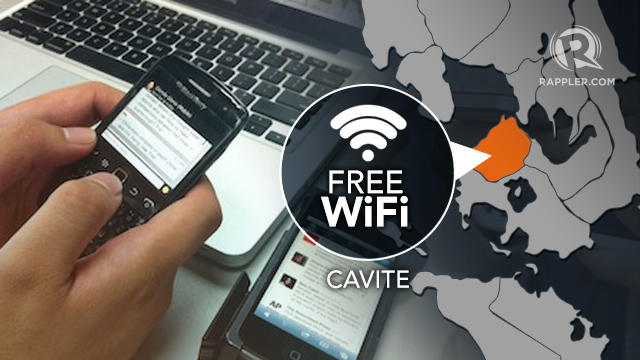SUMMARY
This is AI generated summarization, which may have errors. For context, always refer to the full article.

MANILA, Philippines – The provincial government of Cavite has rolled out its free WiFi access program, a first among local governments in the country.
The Lingkod Kabitenyo program seeks to provide free province-wide WiFi access, especially to schools and households, by next year.
“I’ve always believed that Internet [access] is a privilege. I wanted to give the people a chance to link up to the rest of the world,” Governor Juanito Victor “Jonvic” Remulla told Rappler in a phone interview.
The free service will be officially launched on Monday, December 14. But Camille del Rosario, provincial information technology officer, said some residents have begun using the service after the activation of the first phase on December 9.
The first phase of implementation covers 8 cities and municipalities that have the largest percentage of Cavite’s population: Bacoor, Imus, Dasmariñas, General Trias, Silang, Tanza, Rosario, and capital Trece Martires City.
Cavite’s free WiFi has a capacity of 1 GBps. The government plans to raise it up to 3 GBps by next year to cover the whole province.
The project was awarded to the Philippine Long Distance Telephone Company (PLDT) after offering the cheapest bandwidth rate, Remulla said.
To avail of the service, residents in the covered areas have to connect to the network named “LINKod Kabitenyo.” A pop-up page will appear where they will be required to register and upload a photo of a valid ID.
However, registered users can only enjoy free connectivity an hour a day. Del Rosario said the local government can only allocate this much as the project is still in its initial stage.
Students, teachers, and government employees working on public safety and disaster management will be prioritized.
“Students are given one hour per day with 50 MB volume quota and 1 MBps while teachers are given one hour per day with 50 MB and 2 MBps. We also provide more during disasters,” Del Rosario explained.
‘Smarter’ gov’t service
Del Rosario said the provincial government is developing a Lingkod Kabitenyo website and mobile application, wherein residents may access basic information such as market prices and road safety and traffic reports.
“We also connected municipalities to our network like processing of real tax property payments [to] ease collection,” Del Rosario told Rappler.
All government officials down from to the barangay (village) level will be given smartphones by next year to fully digitize public services.
A World Bank report said that there is a 1.38% increase in Gross Domestic Product (GDP) for every 10% increase in broadband connectivity, illustrating the role of the Internet in economic progress.
Cavite is aware of this relationship. A first class province with an internal revenue allotment (IRA) of P1.8 billion in 2014, provincial leaders are hoping to boost Cavite’s economic growth with this pioneer project.
“If all the municipalities are connected already for phase 2, we are foreseeing more opportunities for students jobseekers, and investors [when] they can see communication is good,” Del Rosario said.
PH-wide free WiFi
The Department of Science and Technology (DOST) is also set to provide Internet access nationwide by yearend.
The project, with a P1.408-billion fund in the 2015 budget, will provide free WiFi connectivity in all public spaces (schools, libraries, government hospitals, waiting sheds, town plazas, and others) across the country.
“Once fully deployed, the project will serve 105,000 concurrent users with 256 kbps each, which is the lowest prevailing speed requirement for ‘broadband’ service. A data volume based Fair Usage Policy shall also be implemented to promote an equitable distribution of the public service,” said the DOST.
Currently, most of the project units are still under the bidding process, based on a December 2015 DOST report. – Rappler.com
Add a comment
How does this make you feel?





There are no comments yet. Add your comment to start the conversation.